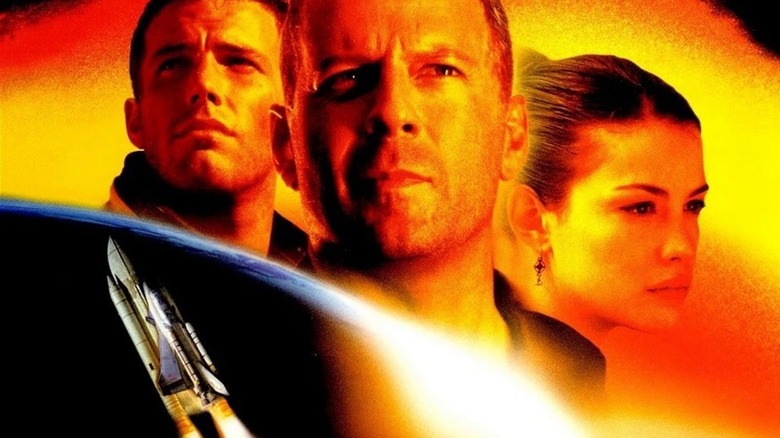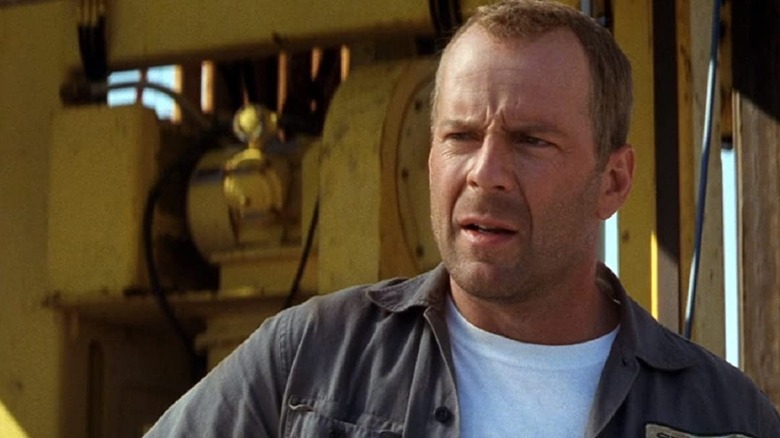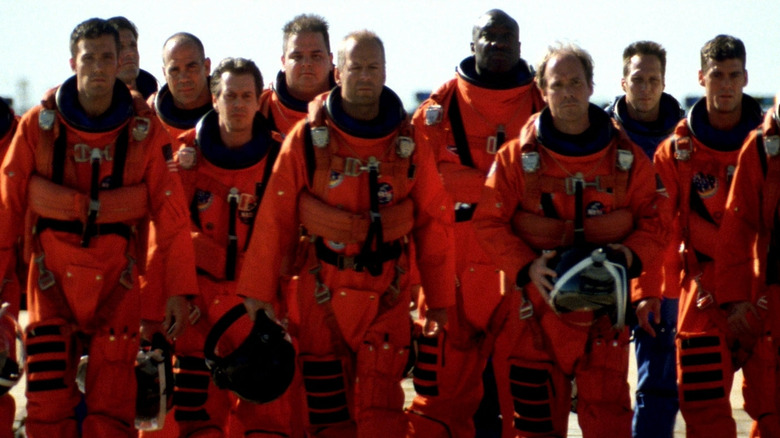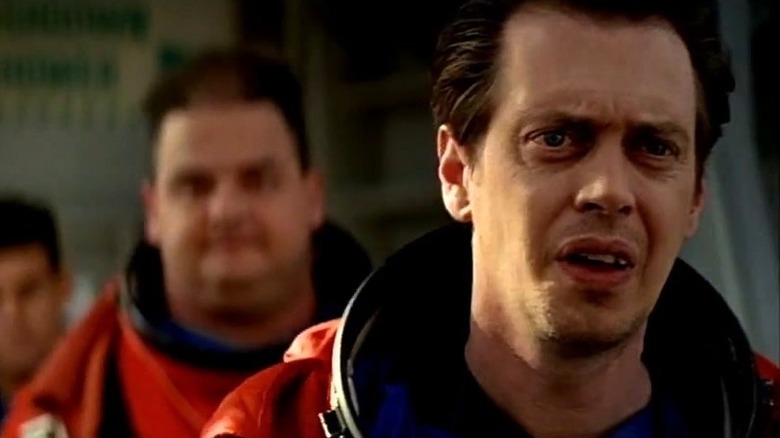Tales From The Box Office: Bruce Willis Helped Make Armageddon The Biggest Movie Of 1998
(Welcome to Tales from the Box Office, our column that examines box office miracles, disasters, and everything in between, as well as what we can learn from them.)
Movie lovers were dealt a massive blow this week when it was announced that cinematic icon Bruce Willis, the star of such classics as "Die Hard" and "Pulp Fiction," is stepping away from acting. The actor was diagnosed with Aphasia, which affects his ability to communicate (for example, putting his thoughts into speech and understanding people when they speak to him). This news has completely recontextualized the last few years of his career and saw an outpouring of support from everyone across Hollywood for the man we all know and love from the silver screen. And in this week's edition of the column, we're going to honor the man by looking back at one of the biggest movies of his career, "Armageddon."
I should state up top that, though this is normally a numbers and analysis column, the news hit me pretty hard this week and I am going to use this as an excuse to toast one of my very favorite actors, so there may be a bit more personal commentary than usual. That aside, we're going to look back at this 1998 disaster flick directed by Michael Bay: how it managed to be the better asteroid movie of that year, how it cemented Willis as a star capable of spanning multiple decades at the top of his game, and what lessons can be gleaned from its success. Let's dive in.
The movie: Armageddon
It cannot be overstated just how much the pieces of the whole did not make up the completed puzzle as we see it in hindsight. Michael Bay was not Michael Bay yet, having directed "Bad Boys" and "The Rock" but not having fully established his specific brand of "Bayhem" just yet. Ben Affleck was only just becoming the great big star Ben Affleck, but he wasn't there just yet. In many ways, "Armageddon" is the movie that made a lot of these people who they are, with Bruce Willis serving as the rock-solid action star at its center to anchor the whole thing.
And the road to success was not an easy one. Bay was working from a pretty preposterous screenplay by Jonathan Hensleigh and (wouldn't you know it!) J.J. Abrams, long before he became one of Hollywood's go-to big movie guys. Sending a team of oil drillers off-planet to stop an asteroid en route to Earth by drilling a big hole in it and blowing it in half with a nuke? Yeah, that is a wild premise to lead with, not to mention making it a gigantic $140 million dollar production from one of the biggest producers in the business, Jerry Bruckheimer.
The craziness of it all wasn't the only issue either, as yet another asteroid flick was on the way from a rival studio in the form of "Deep Impact" from Paramount Pictures, whereas Disney's Touchstone Pictures was handling Bay's admittedly more insane vision of this apocalyptic scenario. So yes, it would be "Deep Impact" vs "Armageddon," with the former movie getting out there first. But first does not always mean best, even if it was the more grounded option. To that end, Bay was very unconcerned with making a realistic movie here. As Affleck famously pointed out in the film's commentary track, Bay wasn't interested in having any of the plot holes pointed out:
"I asked Michael [Bay] why it was easier to train oil drillers to become astronauts than it was to train astronauts to become oil drillers, and he told me to shut the f*** up, so that was the end of that talk."
And so it was that Willis led the way as the world's best oil driller, Harry Stamper, taking his rag-tag crew of fellow oil drillers into space with mere weeks of training to save the world from the most metal-looking asteroid cinema has seen before or since. And audiences ate it up. You could even say that they didn't want to close their eyes, because they didn't want to miss a thing.
The financial journey
What's interesting is that "Deep Impact" was released on May 8, 1998, and actually had a pretty big opening weekend of $41 million, but it topped out at $349 million worldwide. The head start seemed to work in its favor, but Willis and Bay had other plans. "Armageddon" hit theaters right in the heart of the summer moviegoing season on July 1, 1998, and had a very solid $36 million opening weekend, though admittedly a much smaller one than that of "Deep Impact." Yet, over time, "Armageddon" achieved better word of mouth and had better holds from week-to-week. But the real kicker was the fact that international audiences were far more interested in what Willis had to offer — not to mention the rest of the huge ensemble cast full of rising and established stars, with the likes of Liv Tyler, Billy Bob Thornton, Steve Buscemi, Owen Wilson, and Michael Clark Duncan on Bay's side.
In the end, "Armageddon" finished its run with a massive $553 million global total, far better than that of the other asteroid movie that beat it to the punch. The whole "if you ain't first you're last" thing did not hold true here. Star power and spectacle (albeit far less realistic spectacle) won the day in this case. Bay truly asserted himself as a man who understands popcorn cinema here, and Willis proved why he is the star we adore, delivering one heck of a performance a decade after he made the jump from TV to feature films with "Die Hard" in 1988. A full decade later and, just as we were about to make the scary leap into the year 2000, Willis proved that he was just getting started — and audiences were right there with him.
"Armageddon" was the highest-grossing movie of the year in 1998, beating out the likes of "Saving Private Ryan" ($481 million), "Godzilla" ($379 million), "There's Something About Mary" ($369 million), and "A Bug's Life" ($363 million). It is worth noting that James Cameron's "Titanic" was the movie that made the most money in 1998, taking in $488 million domestically alone that year; it initially hit theaters in 1997, so it counts as that year's biggest movies, and still one of the biggest movies of all time. But it was Willis and his selfless heroics that won the day in '98.
The lessons contained within
No matter how plausible science says it is, there is no question that "Armageddon," all told, is a pretty implausible proposal on many levels. That having been said, that is one of the core lessons here. Movies are primarily and for most people on the planet, a form of escapism and meant to be entertainment. Say what you will about Bay but the guy knows how to entertain general audiences. As the industry looks to make a box office recovery that extends beyond superheroes and horror in the post-pandemic era, it's important to remember this.
It matters not that the time travel logic in "Terminator" doesn't really make sense. The movie is good enough to make that easy to overlook. Does it matter that the dinosaurs in "Jurassic Park" don't have feathers as they would have in real life? Absolutely not. Don't get hung up on the wrong things. Movies are movies and (especially in the case of a blockbuster geared to be pure entertainment) they don't have to make sense. That said, "Armageddon" never makes fun of itself. Bay strikes a remarkable balance by committing to the bit. These oil drillers are truly humanity's greatest hope for salvation. It would lose its shine if you suddenly become too self-aware about it. That balance isn't always easy to strike, but just tell and commit to the story at hand and, if the other pieces fall into place, the audience may well find it.
Looking at Bruce Willis specifically, it's worth looking at his performance here and the performances that would follow in the years to come. One thing that I encourage any of you fine readers to do next time you watch this or any one of his movies is to look past the story at hand. Is "Armageddon" insane? Absolutely. But Willis plays the role of Harry with a downright admirable amount of sincerity, so much so that when it comes time for him to take AJ's place and sacrifice himself to save the world, there is not a dry eye in the house.
That is Willis at his finest, and that is a great actor sincerely committing himself to the task at hand. Something Willis would go on to do in a remarkably different way yet again the following year with "The Sixth Sense." Perhaps a better pound-for-pound actor, not just a movie star, than we give him credit for being. The big screen will miss you dearly, good sir, but we thank you from the bottom of our hearts for your contributions.



